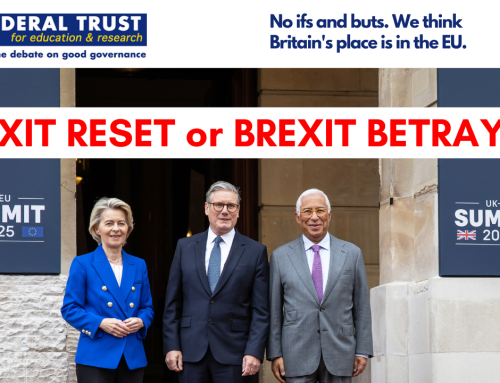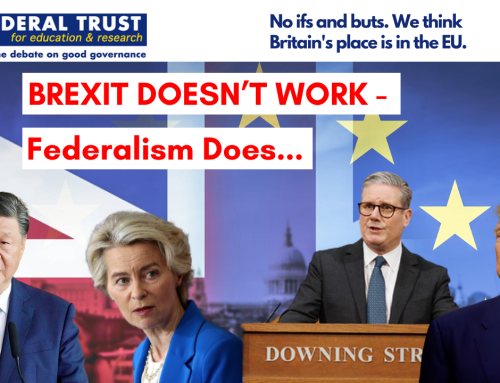The dinner between Boris Johnson and Ursula von der Leyen on 9th December seems to have done little to improve the chances of an agreement on EU/UK trading relations before the end of the transition period. Both sides have interest in achieving such an agreement and it would be premature to exclude entirely the possibility of an arrangement later this year. It is not too early however to reflect on some of the factors from the British side in particular which have led to such fraught, protracted negotiations and may well end up leading to “no deal.”
It’s the referendum, stupid.
The British approach to the Brexit negotiations has been shaped almost entirely by the course of the 2016 referendum. It is widely recognised that untruths and fantasies played a large role in winning this referendum for the Leave side. Less widely recognised however is that the untruths and fantasies which won the referendum were and needed to be self-contradictory. It would have been impossible to construct a majority in favour of any particular model of Brexit, when some of its supporters were determined upon continued close economic association with the European Union and others were equally resolutely against any such association. This difficulty was finessed by providing both camps with arguments and rhetoric favourable to their side of the debate. The electorate was told on the one hand that no significant disruption of economic relations with the EU would occur after Brexit; and on the other hand that the UK would be “taking back control” of its destiny, entirely emancipated from the clammy grip of the Brussels bureaucracy. There was never the remotest suggestion by Brexit’s advocates that these two goals, after fifty years of British membership in the EU, were in tension with each other, or that trade-offs would need to be made between them after the referendum was won.
This wilful ambiguity during the referendum was transferred into government after the resignation of David Cameron. Theresa May’s government understandably contained a substantial representation from the successful Leave campaign, individuals in most cases incapable of recognising that the successful tactics of a national referendum could not simply be transferred into the forum of international negotiations. If they had managed to convince the British electorate that it was possible to derive all or almost all the economic benefits of EU membership from outside the Union, why should they not be able to convince the EU’s institutions and Member States of the same proposition? The EU surely had the same interest in a wide-ranging trade agreement as did the UK. This latter was a fundamental miscalculation. The EU had an interest in such a trade agreement, but it was not the same interest as had the UK. If a “no deal” Brexit occurs, it will be largely because the two sides have different assessments of where their predominant interests lie.
Underestimating the opposition
Theresa May has been much criticised for triggering as early as March 2017 the Article 50 withdrawal process, before she had worked out any coherent negotiating strategy. In truth she had little choice. A distrustful Conservative Party was pressing her hard to take the next formal step in the Brexit process. Her Party moreover was confident that British negotiating skills and the supposed divisions of its opponents would ensure a favourable outcome for the British secessionists. It would have been unwilling to accept any other negotiating strategy than the blind optimism which characterised initial British attempts to make a reality of Brexit.
The past four years have been a painful learning process, leading to the still only partial realisation that the EU is wholly unwilling to play the passive role envisaged for it. It is on the contrary a well-organised and active negotiating partner which is determined to defend what it conceives of as the European Union’s vital interests. The Member States of the European Union have constructed their world-beating internal market on the basis of wide-ranging shared sovereignty. They are entirely unimpressed by claims that the United Kingdom should have access to this market without bringing to the table at least some degree of its own shared sovereignty. Political and economic trade-offs are at the heart of the European Union’s workings. If the UK wishes to benefit from these workings as a third country, the EU-27 can see no reason why it should be exempt from such trade-offs, all the less so in that such an exemption would set a dangerous precedent for others inside and outside the Union.
An important reason why the Leave campaign won in 2016 was a Goebbelsesque campaign over many years in the British Eurosceptic media against the European institutions and the European Commission in particular. Many who voted for Leave in 2016 hoped and believed that Brexit would provoke a collapse of the European Union, as Member States sought to follow the British example in shaking off the oppression of Brussels. This contempt for the EU’s central institutions was well mirrored by the insistence of such leaders of the Leave campaign as David Davis that the important negotiations about Brexit would take place with national capitals and not in Brussels. The misconception that the Commission is in some sense an insignificant and illegitimate interloper into intergovernmental relationships is an abiding one among British Eurosceptic politicians, and one resistant to any contradictory experience of the EU’s day to day functioning.
In reality, Michel Barnier has been zealous in consulting his national clients, who have demonstratively supported him and the Commission President on a number of public occasions, most strikingly at the Salzburg summit in 2018. Even this week Boris Johnson unsuccessfully tried to negotiate with Macron and Merkel before his dinner with von der Leyen. It is impossible to avoid the impression that the British government still harbours the delusory hope that it can sow division to its own advantage between the Member States and institutions of the Union. This was a tactic pursued with some success by British diplomats during British membership of the EU. It is a tactic that has proved much less fruitful since March 2017.
A Conservative house divided
Over the past twenty years, the Conservative Party has fallen prey to an increasingly virulent cult of Euroscepticism, a development concealed to some extent by the continuation in the Party of such few prominent moderate individuals as Ken Clarke and Dominic Grieve. Although they probably do not constitute a strict numerical majority in the Parliamentary Party, there is a substantial number of Conservative MPs who are either content with or actively seek a “no deal” Brexit. They enjoy broad support among the Conservative membership and their views are usually reported sympathetically by the Conservative press. For them, “taking back control” from the EU is the element of the Brexit prospectus that predominates; they either deny or are prepared to suffer the economic consequences of “no deal.” In some cases at least they see “no deal” as facilitating the comprehensive deregulatory agenda to which a part of the Conservative Party is ideologically committed. Most Conservative MPs favourable to “no deal” are untroubled by the regular assurances of the Leave campaign in 2016 that the economic consequences of Brexit would either be minimal or wholly benign.
This reality has ensured that no British government since 2016 has been able to negotiate with the EU in the confidence that it would be supported domestically. More precisely, no British government has been able to enter into the trade-offs necessary for agreement without exposing itself to accusations of betrayal and compromise from the most radical wing of its own Party. This radical wing is well-organised and ruthless beyond its apparent numbers. Boris Johnson was only able to mollify their intransigence last year at the time of the Withdrawal Agreement by denying the clear provisions of the text he had signed and claiming they could anyway be renegotiated. It is not at all clear that he will be able to get away with a similar tactic this year. It may well be more attractive for him to blame the chaos resulting from “no deal” on the EU rather than to accept his responsibility for the only somewhat less chaotic effects of a “deal.” Those favouring “no deal” in his Parliamentary Party are those to whom Boris Johnson primarily owes his Premiership. It would require unwonted determination and resolution on his part to face them down.
Conclusion
Few things are inevitable in history. There are however circumstances that make some outcomes more likely than others. The self-contradictory misconceptions on which the referendum was won; the Conservative government’s underestimation of the determination and unity of the EU; Conservative disdain for the institutions of the European Union; and the internal divisions of the Conservative Party are all factors pointing in one direction only. This Conservative government will find it difficult, perhaps impossible to make and defend to its Party the trade-offs necessary for an agreement. This is a political dilemma striking much deeper than the details of fish, governance or a level playing field and deeply rooted in the incoherent nature of the referendum mandate. Brexit was spawned by the internal politics of the Conservative Party. Its forthcoming temporary denouement will inevitably be dictated by these same internal politics as well.






